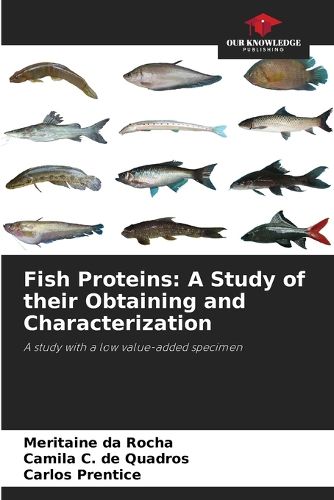Readings Newsletter
Become a Readings Member to make your shopping experience even easier.
Sign in or sign up for free!
You’re not far away from qualifying for FREE standard shipping within Australia
You’ve qualified for FREE standard shipping within Australia
The cart is loading…






Skeletal muscle proteins are organized according to their solubility or biological function. The solubility of these proteins depends on their cellular location and they comprise three classes of proteins, identified as sarcoplasmic, myofibrillar and stromal. Sarcoplasmic, myofibrillar and stromal proteins comprise 20 to 30%, 65 to 75% and 3 to 10% of the total protein present in fish muscle. Myofibrillar proteins, which are important for gel formation and water retention, are insoluble in water but soluble in concentrated salt solutions. Protein isolates are commonly obtained by the pH-shifting process, which consists of protein solubilization by chemical means (acid or alkaline), from co-products, muscle or whole fish, followed by precipitation at its isoelectric point (pI) followed by the simultaneous elimination of lipids and insoluble proteins. This process is an alternative for adding value to products from specimens of low commercial value, such as the chestnut (Umbrina canosai).
$9.00 standard shipping within Australia
FREE standard shipping within Australia for orders over $100.00
Express & International shipping calculated at checkout
Skeletal muscle proteins are organized according to their solubility or biological function. The solubility of these proteins depends on their cellular location and they comprise three classes of proteins, identified as sarcoplasmic, myofibrillar and stromal. Sarcoplasmic, myofibrillar and stromal proteins comprise 20 to 30%, 65 to 75% and 3 to 10% of the total protein present in fish muscle. Myofibrillar proteins, which are important for gel formation and water retention, are insoluble in water but soluble in concentrated salt solutions. Protein isolates are commonly obtained by the pH-shifting process, which consists of protein solubilization by chemical means (acid or alkaline), from co-products, muscle or whole fish, followed by precipitation at its isoelectric point (pI) followed by the simultaneous elimination of lipids and insoluble proteins. This process is an alternative for adding value to products from specimens of low commercial value, such as the chestnut (Umbrina canosai).